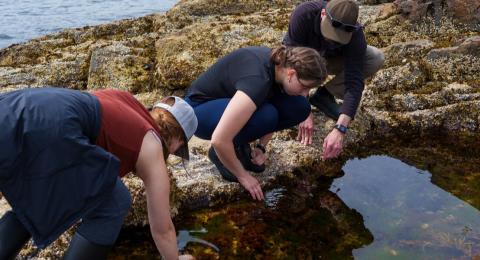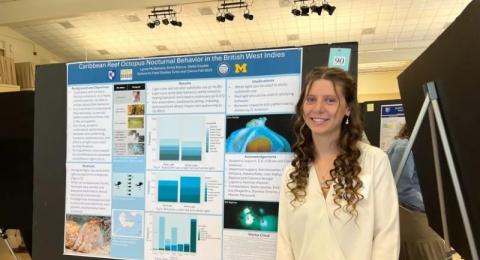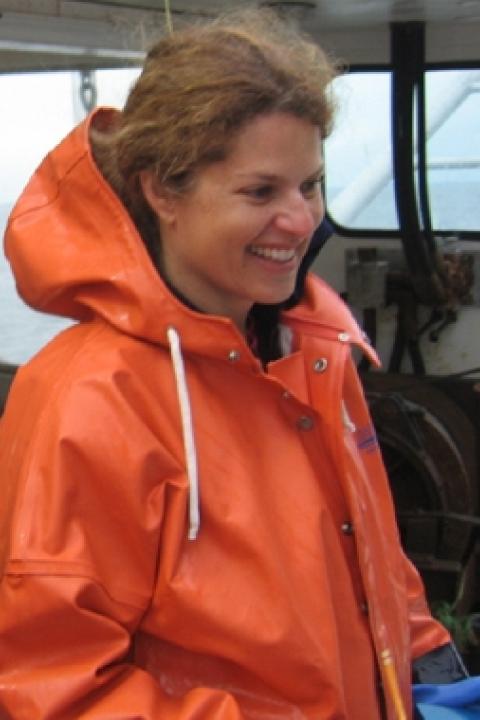The Marine Biology minor at UNH to your degree enhances your understanding of oceanic life forms and their ecological roles, providing a solid foundation for addressing marine conservation challenges. It also sharpens your analytical and research skills, preparing you for advanced studies or roles that involve marine science, environmental policy or resource management.
What is marine biology?
Marine biology is the study of marine organisms and their interactions with their environment. The marine biology minor will give you an introduction to this wide-ranging discipline, which covers everything from the smallest aquatic microbes to the largest marine mammals. You’ll have the opportunity to explore ecology, evolution, biodiversity, behavior and seaweed, fish and shellfish aquaculture. Combine this minor with a major such as biology, neuroscience, marine policy, wildlife conservation, education or environmental studies to enhance your career opportunities or prepare for graduate study.
Why study marine biology at UNH?
State-of-the-art facilities, hands-on learning with an emphasis on undergraduate student research, and an incredible location make UNH the perfect place to study marine biology. The university is close to the New Hampshire Seacoast, providing endless opportunities to study aquatic organisms and their ecosystems. UNH has aquaculture facilities and coastal and estuarine research laboratories such as Jackson Estuarine Laboratory and Judd Gregg Marine Research Complex. Meanwhile, Shoals Marine Laboratory administers the summer undergraduate programs in collaboration with Cornell University on Appledore Island,off the coasts of New Hampshire and Maine. Together, these facilities offer exceptional opportunities to in both research and scholarship.
Potential career areas
- Aquaculture
- Aquariums
- Biotechnology
- Conservation
- Ecological restoration
- Ecotourism
- Education
- Environmental protection
- Fisheries management
- Research
Curriculum & Requirements
The Marine Biology minor is designed to provide a foundation in marine biology and related sciences to any UNH undergraduate student, with the exception of students majoring in marine, estuarine, and freshwater biology. It is offered through the Department of Biological Sciences.
- Academic policies related to Minors.
- The minor consists of five courses (20 credits) with grades of C- or better and no pass/fail courses.
- No more than eight major requirement credits may be used to complete the minor.
To fulfill the requirements for the Marine Biology minor, students must complete a minimum of 18 credits across at least five distinct courses.
| Code | Title | Credits |
|---|---|---|
| Required Course | ||
| MEFB 503 | Introduction to Marine Biology | 3 |
| Electives | ||
| Select three courses from the following: | ||
| ESCI 501 | Introduction to Oceanography | 4 |
| ESCI 502 | Beaches and Coasts | 4 |
| MEFB 506 | Marine Parasitology and Disease | 4 |
| MEFB 510 | Field Ornithology | 4 |
| MEFB 530 | Evolution and Marine Diversity | 4 |
| MEFB 535 | Marine Mammal Biology | 4 |
| MEFB 590 | Coastlines in Crisis | 4 |
| MEFB 625 | Introduction to Marine Botany | 5 |
| MEFB 628 | Marine Invertebrate Evolution and Ecology | 5 |
| MEFB 674 | Ecology and Marine Environment | 4 |
| MEFB 675 | Marine Mammal Biology and Conservation | 3 |
| MEFB 702 | Sustainable Marine Fisheries | 4 |
| MEFB 714 | Field Animal Behavior | 4 |
| MEFB 725 | Marine Ecology | 4 |
| MEFB 741 | Sharks: Biology and Conservation | 4 |
| MEFB 747 | Aquatic Plants in Restoration/Management | 4 |
| MEFB 754 | Anatomy and Function of Marine Vertebrates | 4 |
| MEFB 755 | Biological Oceanography | 3 |
| MEFB 772 | Fisheries Biology: Conservation and Management | 4 |
| MEFB 773 | Physiology of Fishes | 4 |
| ZOOL 610 | Principles of Aquaculture | 4 |
| ZOOL 710 | Sharks and Bony Fishes | 4 |
| Select at least one course from the following: | ||
| BIOL 795 | Independent Investigations in Biology | 4 |
| MARI 533 | Basic SCUBA | 3 |
| MARI 705 | Introduction to Marine Policy: Understanding US Ocean, Coastal and Great Lakes Policy | 3 |
| MARI 730 | Research Diving Technologies | 4 |
| MARI 735 | Advanced SCUBA | 4 |
| MEFB 508 | Marine Ecosystem Research and Management | 4 |
| MEFB 730 | Underwater Research | 4 |
| MEFB 751 | Research in Biology at the Shoals Marine Lab | 4 |
| MEFB 795 | Independent Investigations in Marine, Estuarine, and Freshwater Biology | 4 |
| ZOOL 795 | Independent Investigations in Zoology | 4 |
In addition, students are encouraged to become involved in a research project, either by working in a professor's laboratory or by participating in the Undergraduate Ocean Research Project (TECH 797 Undergraduate Ocean Research Project).


















